I’ve been working with Cheryl and Beverly to thoroughly revise my web site. If you haven’t browsed davidbrin.com in a while, have a look! It’s now fleshed out and filled with even more fabulousness!

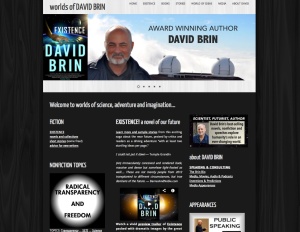
As part of this, we’ve thrown together a FAQ of sorts -- a compilation of questions that I’m asked most often by interviewers. We’ll post them here by category, starting with…
== ON WRITING ==
-- Being an author wasn’t your first career choice; you earned a Ph.D. in astrophysics. How did your multi-track career evolve?
 I came from a family of writers and always figured that storytelling would be my artistic side-line… most scientists have one. I knew science would be harder that storytelling and I respected it more, drawn to the Enlightenment’s greatest project. After all, every culture has had storytellers, but only one ever invested heavily in training a myriad brave investigators to find out what’s actually true, despite our preconceptions.
I came from a family of writers and always figured that storytelling would be my artistic side-line… most scientists have one. I knew science would be harder that storytelling and I respected it more, drawn to the Enlightenment’s greatest project. After all, every culture has had storytellers, but only one ever invested heavily in training a myriad brave investigators to find out what’s actually true, despite our preconceptions.
And indeed, I managed to contribute a few new bits of knowledge…. while maintaining passion for my art. (And I incorporate my science into my art, as in Heart of the Comet.)
Ah, but sometimes life takes a turn. Your pastime can take over and become the central profession. I was a pretty good scientist and I still keep my hand in the game. But civilization seems more eager for my art, for tales that shed a different kind of light on the transformations we’re all going through. And who am I to argue with civilization?
-- What is special about writing? What drew you from seeking scientific facts to literary truths?
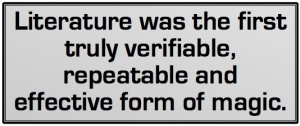 Literature was the first truly verifiable, repeatable and effective form of magic. Picture how it must have impressed ancient people to look at marks – on papyrus or clay – and know they conveyed the words of scribes and kings long dead. Knowledge, wisdom and art could finally accumulate. Death was robbed some of its sting.
Literature was the first truly verifiable, repeatable and effective form of magic. Picture how it must have impressed ancient people to look at marks – on papyrus or clay – and know they conveyed the words of scribes and kings long dead. Knowledge, wisdom and art could finally accumulate. Death was robbed some of its sting.
Writing still is magical. To create strings of black squiggles that millions of others skillfully de-code with just their eyes – into emotions and thoughts, or the struggles of believable characters – or spectacle beyond Hollywood’s wildest dreams.
Still, despite all of that, science and the honesty that it engenders have been our true accomplishments. I believe in a literature that explores this revolution, that presents alternatives and hard choices and that might help us to be wise about the onrushing process of change. One that helps to remind science and progress that it needs a heart. I reject the dichotomy, the notion that these things oppose each other.
When a chance came along to combine the two? Who wouldn’t grab the opportunity?
--Was Science Fiction always your chosen genre?
Though SF offers me the freedom I need to explore a world undergoing drama and change, I often tell writing students that their first work of fiction should be a murder mystery.
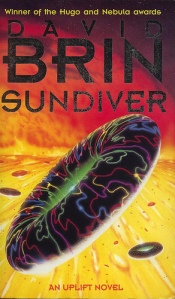 Oh, it can be an sci fi mystery, like my first novel, Sundiver. Or you might give it romance or set it in the wild west, or ancient Rome. What matters is that it should follow the plot patterns and revelatory structure of a mystery yarn.
Oh, it can be an sci fi mystery, like my first novel, Sundiver. Or you might give it romance or set it in the wild west, or ancient Rome. What matters is that it should follow the plot patterns and revelatory structure of a mystery yarn.
Why? Because only mysteries demand total story-telling discipline. No distractions or arty styling or array of gimmicks can mask or make up for bad plotting. This all becomes apparent when the reader finds out who-dunnit in a mystery. In the end, the reader knows whether or not you cheated. And once you’ve had that lesson, you will never neglect it again.
--Do you develop the world of a novel fully in your mind before beginning to write?
I like to be surprised. Fresh implications and plot twists erupt as a story unfolds. Characters develop backgrounds, adding depth and feeling. Writing feels like exploring.
Oh, I sometimes plot an outline in advance. That works well. Still, not too much detail! I like to be surprised.
--Do you have any advice for up and coming writers?
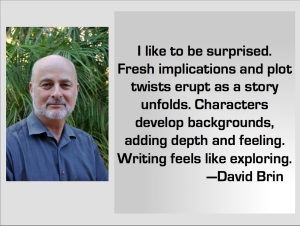 Write. Love writing. Love stories. Love the sound of language, the vividness of description and ironies of the heart. The marvelous web of misunderstanding that is conversation. The astonishing, non-linear gyrations of cause and effect and surprise.
Write. Love writing. Love stories. Love the sound of language, the vividness of description and ironies of the heart. The marvelous web of misunderstanding that is conversation. The astonishing, non-linear gyrations of cause and effect and surprise.
Ray Bradbury said that – deep in the heart of the writer’s relationship with story and reader, there has to be love! Love the words. Love the tension that propels your plot and characters like a steam boiler. Love a civilization that gives you plenty to read and the food and shelter and safety to do it in comfort. Love to poke hard at that civilization’s flaws. Love the fact that you have enough conceit to think others might like to read your drivel!
Only then, amid that love... be competitive! Aim to do it better than anybody else. Have patience to refine your craft… but never stop burning. Burn like a flame. An inferno.
Art is like any other exercise in skill: a combination of talent, hard work and learning from criticism. And luck. Any three of those things can make up for a deficit in the fourth one. But those three had better be really strong.
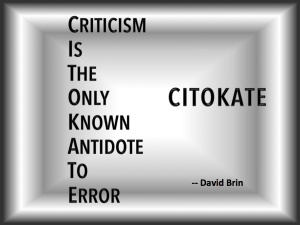 The core point? CITOKATE: Criticism Is The Only Known Antidote To Error!
The core point? CITOKATE: Criticism Is The Only Known Antidote To Error! Seek and relish criticism, because that is how to get even better. If you put your work out there and look upon criticism as your friend -- (not easy, but worthwhile) -- you will improve. And having that attitude will gain you real advantages, leveraging your talent, however great or small it may be.
Good luck. There are lots of ideas out there waiting to be mined. It's not an endangered resource.
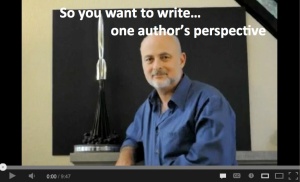 That's only a very small summary of a long list. There's lots more. After typing countless answers to requests for advice from would-be writers, I finally put it all together in a handy place. It's available on my website: A Long, Lonely Road: Advice to New Writers, as well as a YouTube presentation: How do you succeed at writing fiction?
That's only a very small summary of a long list. There's lots more. After typing countless answers to requests for advice from would-be writers, I finally put it all together in a handy place. It's available on my website: A Long, Lonely Road: Advice to New Writers, as well as a YouTube presentation: How do you succeed at writing fiction?
=================
Part II: Questions I'm Frequently Asked: About Science Fiction and Fantasy
Part III: Questions about Brin books, Uplift and The Postman
Part IV: Questions about...Prediction and the Future
Part V: Questions about...Transparency, Privacy and the Information Age
David Brin

13 comments:
The iMac is a GREAT computer, David. I am really enjoying mine. You won't need a new one for 7+ years again. I went with the fusion too.
Hey, I've been meaning to ask you, what program do you write in? I've enjoyed the extensive cross-referencing and outlining tools in Scrivener, it's nice to bring up all the chapters with a minor character as a concatenated document to see if language usage is similar throughout....
-Jason (from NIAC)
BTW, Dr. Brin, I found this rather interesting article about the geology of Skyrim, a large-scale fantasy roleplaying computer game set in a Nordic cultural setting, and the possibility of scientists collaborating with computer game manufacturers in the future to better create games that are scientifically accurate... and useful for educational purposes.
Rob H.
RE: RPG geology
Interesting article. It reminds me of Neil Stephenson's newest (?) book Reamde (sic). A major element of the plot is a Warcraft-esque RPG which was created and operates based on the principles of geology.
Jason hi. I am enjoying most aspects of my new iMac.... the huge, vivid screen. The much quicker web access. So here's my report... plus a couple of questions/appeals:
REPORT ON DAVID'S NEW IMAC
1) My iMac STARTS UP much more slowly than in the store. I paid to have my data migrated from my old G5, so did they mess up a setting? Fusion drive should be quick at startup. (And yes the mac-HD is the assigned startup.)
2) Quickeys works in 10.8!!! Hurray. I would have gone crazy without it. And you guys are all crazy not to use it.
3) I was able to download that special utility that run's an OS 9 "classic" simulator on this new 10.8 -- and it can access my old WordPerfect3.8 files! Alas, it is clunky and I must pass every file through the unix folder ("documents") ... and the window won't re-size... it means I can access my old files and copy them to put them into word. Great....
4) But it also means I must use WORD which is like having imps on my shoulder, hitting my head with ball pean hammers while I work. Just ONE old Word Perfect trait "show codes" would be worth any effort to restore! Do any of you know a word processing program that does that?
5) Alas... "Windowshade" has not been upgraded to run on 10.8. I love it. Someone notify me when they have it available? I hate minimizing to the dock.
6) Hm... otherwise, I am a pretty happy guy. Since 1980 every computer I've bought has cost the same number of dollars... tho a lower fraction of my cash and delivering better service.
Dr Brin,
in MSWord give this a try:
Format-->Reveal Formatting
(and perhaps check the "Show all formatting marks" box to see if that helps).
I know it's not the same thing, but it might help.
D
'Show codes' in Word terms means reveal (and tweak) the control characters behind stuff like bookmark references etc. Is that what it means in WordPerfect terms?
Before running and finding out myself, I must ask if faq discusses what ever happened Creideiki, and Orley, and co.
alas, "Reveal Formatting" does not show you the actual codes that cause weird stuff to happen, like suddenly starting a list when you never wanted one. No way they would ever let you see the code and eliminate it.
You've probably heard reports of a large bolide over Russia, and seen some of the dozens of spectacular camera shots of the event. Why do Russians have so many dashcams? Here's an interesting background report.
If your drive is filled to a higher percentage than the ones at the store, the disk check routines might be taking longer I suppose. If you restart a few times in a row and they all take a long time it is probably worth asking one of the genius types at the store. The full disk check shouldn't have to run every time unless you are powering down before letting the OS shutdown first.
There are other things besides Quickeys. Not using anything is nuts, though.
Revealing the codes is a bit like revealing the html when writing web content. You can do it, but why? If the tool is poorly written and requires that kind of meddling, don't use it. I prefer Open Office (XML behind the scenes now) and have for years even when I used a win32 machine. I use Word at work, but only because I have no choice in the matter. I remember WP and appreciated the codes, but it is just a markup language. Any markup language will suffice if it is rich enough and the tool should do the work... not you.
Thanks a differ. Helpful. Except if you do not grasp why I'd like to be able to tell WORD to "stop doing that!" then either you are a genius at manipulating that awful product or you have a very high tolerance of pain.
I hear you, David. I *still* use good old Word 97, which I have utterly beaten into submission over the years. It no longer "corrects" my spelling; it no longer makes "helpful" suggestions; and it will put on the screen exactly what I type if it bloody knows what's good for it ;-)
Rumor has it the meteor was a bolide. Do the Russians now have a strategic advantage in bolides and what is Obama failing to do to remedy this crisis???
We can't be sure until we've seen the meteor's birth certificate, which the White House is REFUSING to release!
Sure, some people support immigrant rocks arriving on earth without proper paperwork, but what about the increasing violence of their attacks ... over 1000 people were injured yesterday alone!!! There isn't enough work now for the rocks that are already on this planet so why we need more?
Send the bolides BACK WHERE THEY CAME FROM!!! Not enough people recognize the GRAVITY of the situation.
onward
Post a Comment